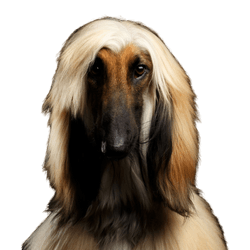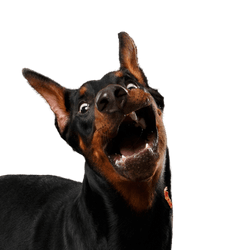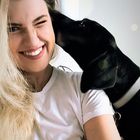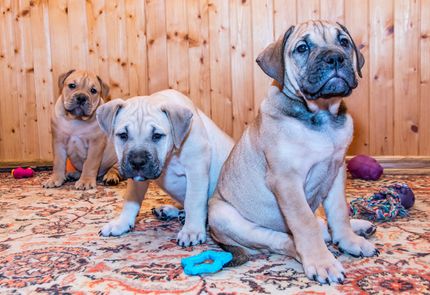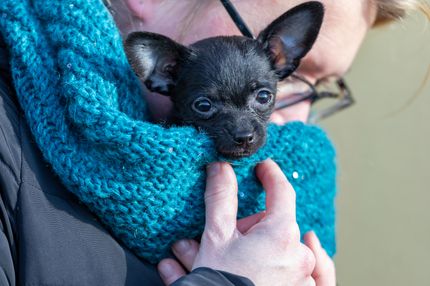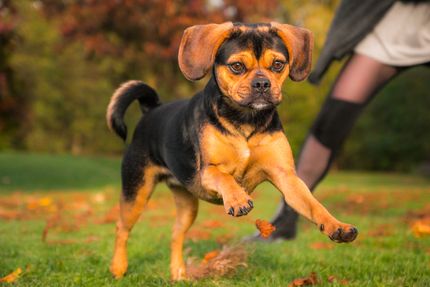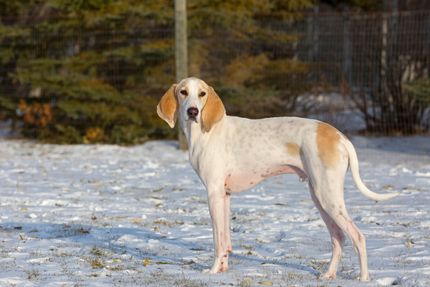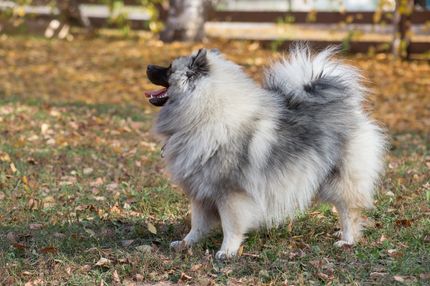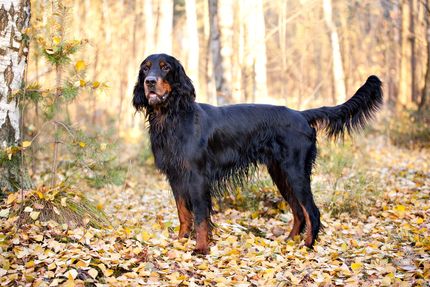Facts & Origin
Doberghan ( Doberman and Afghan Hound Mix )
The Doberghan is a fascinating hybrid breed created by crossing the Doberman and the Afghan Hound. Both parents have a rich history and contribute to the unique characteristics of this mix.
The Doberman: Originally bred in Germany, the Doberman was developed as a guard and protection dog. He is known for his loyalty, intelligence and working ability.
The Afghan Hound: The history of the Afghan Hound goes back centuries and is associated with hunting and nobility in Afghanistan. The Afghan Hound is known for its majestic appearance and speed.
His unique personality, energy and intelligence make him a challenging but fascinating companion for experienced dog owners and active individuals. With sufficient exercise, mental challenge, and loving training, the Doberghan can grow into a loyal and protective companion who enriches the lives of his family. Its elegant appearance and protective instincts make it an impressive dog that will attract the attention of many dog lovers. If you are looking for a loyal and energetic dog, the Doberghan could be the perfect choice for you.
| Alternate Name | - |
| Origin | Afganistan - Germany |
| Life expectancy | 10 - 14 years |
| Care requirements | high-maintenance - low-maintenance |
| Activity level | average |
| FCI group | not recognised |
| AKC group | not recognised |
| KC group | not recognised |
More Afghan hound mixes
More Doberman mixes
Attitude, character and temperament of the breed
Possible character traits
The Doberghan combines the best traits of both parents, developing a unique character.
Elegant and Majestic: The Doberghan inherits the elegant and majestic appearance of the Afghan Hound. He is often a striking dog with a noble appearance.
Intelligent and Obedient: The Doberghan has inherited the intelligence and obedience of the Doberman. He is easy to train and can learn complex commands quickly.
Loyal and Protective: The Doberghan is usually a loyal and protective dog that can be wary of his family when confronted with strangers.
Energetic and Active: The Doberghan has a lot of energy and stamina, which he needs to expend through regular exercise and mental challenges.
Suitability and attitude
The Doberghan is a versatile dog that does well in a variety of households: Because of his intelligence and protective instincts, the Doberghan is better suited to experienced dog owners who understand his needs and can train him consistently.
However, he can also be a good fit for active individuals or couples who can devote a lot of time to exercise and training.
Character
Care and health
The care of the Doberghan requires special attention to ensure his well-being: the Doberghan needs a lot of exercise and mental challenge to be happy and balanced. Long walks, running or dog sports are important for his physical and mental health.
The Doberghan's coat can be short and silky and requires little grooming. Regular brushing and occasional bathing are usually sufficient.
As with all dog breeds, the Doberghan can be subject to certain genetic health problems. These include hip dysplasia and heart problems. Regular vet visits and a balanced diet are important to maintain his health.
What does this mixed breed look like?
Physically, the Doberghan can have characteristics of both parents:
Size: it is usually a medium to large dog with a shoulder height of 60 to 70 cm.
Weight: The weight usually varies between 25 and 35 kg.
Coat and Color: The Doberghan often has short and silky coat that can be found in various colors such as black, brown, blue and brindle.
Build: The Doberghan has a lean and muscular build, similar to the Afghan Hound.
| Fur length | long - short |
| Fur | flat coated |
| Ear shape | Floppy Ear |
| Tail | lang |
| Anatomy | slim, sporty, strong, sporty, square |
| Size ♀ | 61 - 69 cm |
| Weight ♀ | 25 - 45 kg |
| Size ♂ | 66 - 74 cm |
| Weight ♂ | 25 - 35 kg |
| Suitable For | - |
Known Diseases
Hip dysplasia (HD)
Hip dysplasia (HD) is a genetic condition in dogs where the hip joint is not shaped properly. This leads to pain, stiffness and restricted movement.
Cataract
Cataracts are still one of the most common causes of blindness, even in dogs.
Myelopathy
Degenerative myelopathies of dogs are a series of slowly progressing neurological diseases associated with destruction of the spinal cord. These diseases are associated with slowly progressive movement disorders of the hindquarters.
Hypothyroidism
Hypothyroidism is a condition in dogs where the thyroid gland does not produce enough thyroid hormones. This can lead to a slowed metabolic rate, weight gain, fatigue, hair loss and other symptoms.
Wobbler syndrome
In veterinary medicine, this is the name given to a complex of symptoms caused by nerve damage in the area of the spinal cord or spinal cord nerves in the area of the cervical spine.
Blue Doberman Syndrome
Blue Doberman Syndrome (Alopecia). This is a hereditary disease that leads to progressive hair loss.
Dancing Doberman Diseas
Initially, there is only bending of the legs, which is caused by muscle failure. In the advanced stage, the disease then leads to paralysis.
Ataxia
Ataxia (from Greek ἀταξία ataxia 'disorder' 'irregularity') is a generic term in medicine for various disorders of movement coordination. Ataxia can occur even when there is no paralysis (paresis), that is, when there is normal muscle strength.
Heart disease
Can occur frequently in dogs and can sometimes be treated with medication.
FAQ
-
The Doberghan is energetic, lively, loyal and faithful, and both intelligent and adaptive.
-
All breeds can be subject to congenital health problems. In the case of the Doberghan, it may have hereditary diseases of its parent breeds.
-
This mixed breed needs a diet adapted to its activity level, age and size.
-
At the beginning, you should learn the basics of dog training so that you can build a strong bond with the dog. Besides, it is important to train the dog regularly and take care of proper grooming.
-
As a rule, dogs should not be left alone for more than 4-6 hours, as this can cause them stress and boredom.
